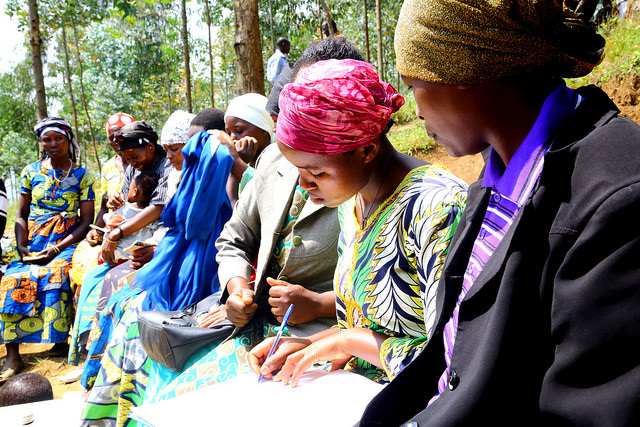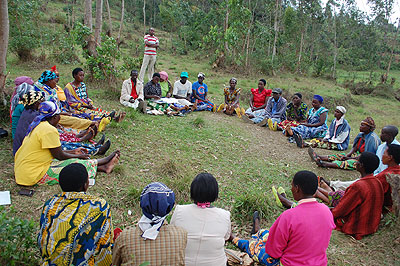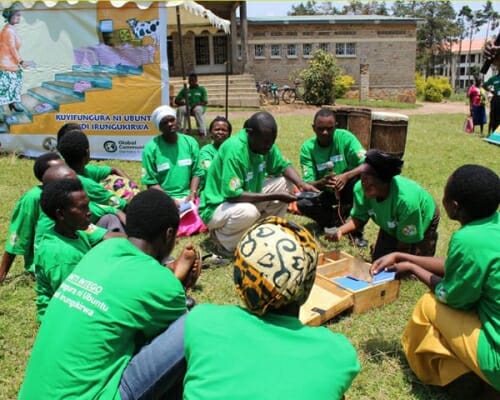Every Friday evening in a small room at Kimironko Market, a group of neighbors gathers. They bring a few thousand Rwandan francs each, a small contribution for some, a significant amount for others. Together, they pool their money, share stories, and wait for their turn to access the collective fund.
This is an ikimina, part of Rwanda’s local savings tradition called ibimina, informal community savings and lending groups that have quietly become a cornerstone of financial resilience for many Rwandans. Now, the government’s RNIT Iterambere Fund is linking these grassroots practices to formal investment opportunities, creating new pathways for ordinary citizens to grow and protect their savings.
What Ibimina Are and How They Work
According to the Ministry of Finance, informal savings groups (ibimina) are “groups formed when individuals organize themselves to collectively save a defined portion of their income on a regular basis (daily, weekly, or monthly).”
Ms. Scholastique Mukamusana, a trader at Kimironko Market and a member of ‘Ikimina Mutimawurugo, explains: “In our group I pay Rwf 2,000 every week. At the end of the year, I receive my savings plus the surplus. It’s easier because we meet and trust one another.”
Typically, ibimina function through pooled contributions. Members may receive the full amount in turn, or borrow from the fund and repay with a small-agreed interest. Global Communities notes that each group usually has about 30 members, with contributions paid weekly, and loans distributed at each meeting.
These groups are especially important for those without easy access to banks or microfinance institutions. They encourage regular saving, provide emergency loans, and create a support network for members, many of whom are women.

Benefits for Members and Long-Term Security
Ibimina offer several advantages:
- Savings discipline: By contributing regularly, members develop a habit of saving.
- Access to small loans: Funds are available for business, education, or household needs.
- Economic empowerment: Research in Nyamagabe District shows members use ibimina funds for small business, farming, housing, and schooling.
Mukamusana reflects on her experience: “Before I joined the savings circle, I struggled to put aside money. Now I feel confident I can handle future challenges.”
The structured saving model also helps members plan for the long term, including old age, by building assets gradually and reinforcing financial security.
Connecting Ibimina to the RNIT Iterambere Fund
At the national level, the RNIT Iterambere Fund allows individuals, cooperatives, and savings groups to invest with contributions as low as Rwf 2,000.
“The more savings we receive, the more investment opportunities we unlock, and that generates strong returns for our citizens.” Said Mr. Jonathan Gatera, CEO of RNIT.
In 2024, the fund collected Rwf 17.6 billion and delivered an annualized return of 11.78 percent to unit-holders. For ibimina members, the Iterambere Fund offers a bridge from informal savings to professionally managed investments, promoting wealth growth and economic inclusion.
Policy and Regulation: Securing Savings
Historically, ibimina were informal, with limited legal recourse for members if funds were mismanaged. In August 2024, the Ministerial Order n°001/24/10/TC established rules for tontines (including ibimina).
Highlights include:
- Registration with sector-level administration and adoption of group statutes.
- Minimum membership of five, with a unique name and agreed procedures.
- Oversight by the Ministry of Finance to protect members’ funds.
“This regulation ensures security of members’ funds and accountability, reducing risks of mismanagement.” Explained Jean Paul Ibambe, a legal advisor.
Voices from the Ground
“When I deposit my share, I know there are rules and oversight now. It makes me trust the system even more,” says Mukamusana, a trader at Kimironko Market. And Jean Kamanzi, board member of one ikimina in Busasamana Sector adds: “Since registering under the new rules, we have zero defaults and smoother fund management.”

The CEO of RNIT underlines that only 33,000 people out of an estimated 8 million working Rwandans are saving with them. He emphasizes that there is huge room to grow.
Challenges and Opportunities
Despite their success, ibimina still face challenges: misallocation of funds, member defaults, and inflation risk. Scaling informal savings into formal long-term investment remains gradual but promising.
A Story of Transformation
From Rwanda’s rural hills to the offices of Kigali’s financial institutions, the story of ibimina and the RNIT Iterambere Fund demonstrates how local, community-driven savings can feed into national economic growth. Neighbors helping neighbors, supported by government-backed policies and formal investment vehicles, are securing their present and planning for the future.
“Where will I save?” might once have been a question for tomorrow. Today, for many Rwandans, the answer is “in my group …” and then “in my fund.”








